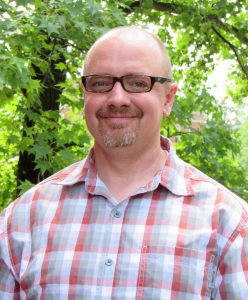
Ray Pelling graduated from Pittsburgh Theological Seminary’s master of divinity degree program in 2023. Seminary pushed Ray to reexamine his ideas about God, himself, his community, and the relationships between these groups. The journey was challenging, but richly rewarding. For example, Ray left seminary with new eyes to see the beauty—and invitations—of Scripture. As he reengaged with the gospel in a new way at PTS, Ray was able to see how the Bible challenges its readers to avoid easy answers and, instead, keep pressing on in the journey of faith. In this blog post, Ray reflects on both the challenges and the spiritual enrichment in his recent seminary experience.
This interview has also been edited into an audio file; listen below:
– Sarah Betzig ’21, Communications Strategist, Pittsburgh Theological Seminary
Cradle Christian
 I was raised Christian, and I’ve been a part of maybe eight or nine different denominations. I was introduced to Christ through bedtime stories as a kid, like Tolkien’s The Hobbit; the first way I met Jesus was through Aslan in the Chronicles of Narnia. Literature is something I’ve always enjoyed.
I was raised Christian, and I’ve been a part of maybe eight or nine different denominations. I was introduced to Christ through bedtime stories as a kid, like Tolkien’s The Hobbit; the first way I met Jesus was through Aslan in the Chronicles of Narnia. Literature is something I’ve always enjoyed.
Even though I’ve been part of the church for such a long time, I was surprised at how many things I ran into at this Presbyterian seminary that I had never heard of before. For example, “Reformed” (as a tradition and as a lifestyle): the church is “reformed” but “always reforming.” As a personal practice, too, we are reformed, and we’re always reforming: theoretically, we’re always growing, rather than just taking a pew space every week. That as a broad concept would describe several experiences that I’ve had at seminary.
A Re-introduction to Jesus Through the Gospel of Mark
One experience I really enjoyed was an elective class in the Gospel of Mark. For such a long time, Christians have seen the Bible carved up into chapters and verses that weren’t there when the books were made. One of our first practices for the Mark class was to be given a reader’s version of a translation of Mark and just read it through—no chapters, no verses, just Mark presented as it was. It had me see the Gospel in a whole different light: the way that it’s put together, the way that the characters interact with Jesus, and the things that Jesus does. Taking the Gospel as a whole, you get more of an overview of it, rather than only analyzing the tiny bits; you can see the whole automobile as it is instead of just studying the wheel. The lectionary is great, but when we’re used to reading the Bible by just citing one certain verse, we can lose overall themes, and those are very much necessary for speaking about things of faith, like the love of God and what our responsibilities are.
 There’s things that Mark does that I haven’t seen any other book do, and it’s really fascinating. The theme of parables is layered in it, and partway through reading Mark, you realize that you are sucked into it, and you are now part of the parable. And the entire Gospel itself is a parable, and you are part of it, going through it along with the disciples. You are seeing all these things happen, and it requires you to make a call as to who Christ is and what that means for you now. It’s really brilliant.
There’s things that Mark does that I haven’t seen any other book do, and it’s really fascinating. The theme of parables is layered in it, and partway through reading Mark, you realize that you are sucked into it, and you are now part of the parable. And the entire Gospel itself is a parable, and you are part of it, going through it along with the disciples. You are seeing all these things happen, and it requires you to make a call as to who Christ is and what that means for you now. It’s really brilliant.
One of the parts of Mark that really blew me away is a time when Jesus is talking with the disciples about their experiences over the last couple days. He’s quizzing them; he’s like, “How many baskets were there when I fed the 5,000 people?” And the disciples give him an answer. And Jesus is like, “So you guys still don’t get it?” And the Gospel leaves it at that! “Oh, you don’t get it?” And the audience is going, “Well, what’s the answer?!” And author’s like, “Hmm . . . you better think about the answer. Sorry, this is a thinking class; this isn’t just ‘throw answers at you’ class.” It was such a trip.
“Further Up and Further In” – Responding to an Infinite God With Ever-Expanding Faith

As dogmatic Christians, we love certainty. I was raised in a tradition of certainty: “This is what the Bible is; this is how things are; this is what we do.” But personally, every time I try to put God in a box, God breaks that box. And so I I’ve learned the hard way: “Well, I guess I’ll always be reforming—be reformed and reforming my box.” And God will keep breaking that box as long as I’m considering who God is, our response to God, and what we’re supposed to do here on earth.
Next Steps
- Learn about the Seminary’s Master’s Degree and Certificate programs (residential or distance learning)
- Apply to PTS
- Attend an upcoming Information Session online
- Contact the Admissions Team with questions



